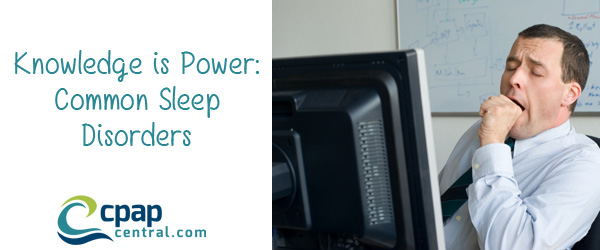At CPAPCentral.com we’ve got you covered when it comes to information about sleep apnea and providing you with the CPAP supplies you need. However, sleep apnea is just one of many sleep disorders that impact people across the world when they try to sleep.
Whether you’re having trouble falling asleep, sleeping too much, or facing another sleep disorder, CPAPCentral.com wants to make sure you have as much information as possible about various sleep disorders so you can receive effective treatment.
Insomnia
Among the most common sleep disorders, insomnia’s main symptom is extreme difficulty falling asleep. When we don’t get enough sleep, it can lead to a wide range of side effects, including taking away our energy and disturbing our focus. This leads to a change in mood and can also affect performance at work and quality of life. Insomnia has a wide range of treatments, which can include everything from medication to providing patients with education on proper sleeping habits like controlling stimulus before sleep, setting a regular sleep schedule and performing relaxation techniques before bed.
Narcolepsy
You can think of narcolepsy as the polar opposite of insomnia. Narcolepsy causes excessive drowsiness and can force people to suddenly fall asleep. This is a chronic condition with no known cure that can wreak havoc on your daily routine. Additionally, narcolepsy may lead to other sleep disorders. Common forms of treatment for narcolepsy include medications that stimulate the nervous system and reduce REM sleep and making lifestyle changes like starting a sleep schedule, avoiding alcohol, and exercising regularly.
Restless Leg Syndrome
The name really says it all with restless leg syndrome, also known as RLS. The main symptom for RLS is people will experience an urge to move their legs while their lying down. This urge can be painful and can occur any time your legs are at rest, whether your lying in bed or sitting in a chair. Treating RLS is all about managing symptoms through measures like limiting caffeine and alcohol, and creating an exercise plan. RLS can also be a result of vitamin deficiency and symptoms can be made worse by prescriptions and over-the-counter medications.
If you are experiencing any symptoms related to these three conditions, please make an appointment to see your doctor. During your appointment, it’s important to share as much information with your doctor as possible so you can receive an effective treatment plan.

